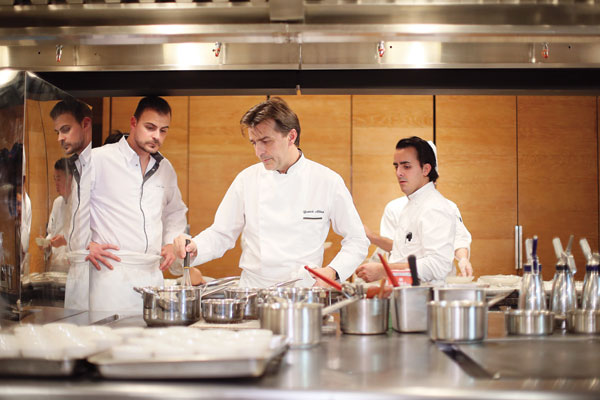Yannick Alleno: Here to S.T.A.Y.
 |
|
MASTER CHEF: Yannick Alleno says sauce is the "verb" of a cuisine.[Photo provided to Shanghai Star] |
Part poet, part kitchen revolutionary, Asia’s favorite French chef tells Matt Hodges why the trick is to go back to the sauce.
Ahead of his gala dinner at the Park Hyatt Shanghai, three-star Michelin chef Yannick Alleno is explaining why his sauce-extraction methodology got him voted Chef of the Year 2015 by the prestigious Gault-Millau, or Gayot Guide.
It is a simple conceit — remove flavors to enhance the taste — with a whiff of genius about it. Even after the final act of fermentation, for example, the residual mineral content of the sauce, or vegetables, can replace salt as a natural additive.
This is the second time the guidebook has named him its chef of the year.
"In France, we had a period when we didn’t want any sauces, because they were too fatty, and things like that, and that’s why sauces disappeared from our plates," says Alleno.
"That’s why I work on the new way of making sauces, because I think the sauce is really the verb of the cuisine. Without sauce, we don’t have any story."
This bleeds into a Hitchhiker’s Guide to French Culinary History that takes us back to 16th century France, when espagnole was practically a universal sauce. According to Auguste Escoffier, it ranks as one of five "mother sauces" in classic French cooking.
Fast forward 300 years, beef and chicken stocks had taken precedence. These developed into more refined "jus" stocks in the 1900s, but even these still relied on fire as the final dictator to control their flavor by adjusting the level of concentration.
"We didn’t find any new sauces in the 20th century," says Alleno. "But you want to know the real taste of the carrot, or the chicken, or the fish, so I do extraction ... I try to find the right temperature for each product. If you exceed that, you have destruction."
















